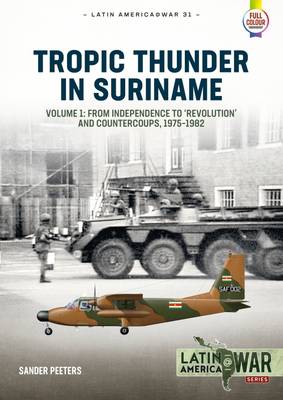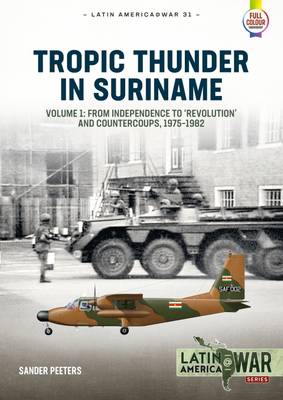
En raison d'une grêve chez bpost, votre commande pourrait être retardée. Vous avez besoin d’un livre rapidement ? Nos magasins vous accueillent à bras ouverts !
- Retrait gratuit dans votre magasin Club
- 7.000.000 titres dans notre catalogue
- Payer en toute sécurité
- Toujours un magasin près de chez vous
En raison de la grêve chez bpost, votre commande pourrait être retardée. Vous avez besoin d’un livre rapidement ? Nos magasins vous accueillent à bras ouverts !
- Retrait gratuit dans votre magasin Club
- 7.000.0000 titres dans notre catalogue
- Payer en toute sécurité
- Toujours un magasin près de chez vous
Tropic Thunder in Suriname
Volume 1 - From Independence to 'Revolution' and Countercoups, 1975-1982
Sander Peeters
27,95 €
+ 55 points
Description
Absolutely exclusive reconstruction of military dictatorships, multiple coup attempts and a civil war in Suriname of 1980s.
One of the three Guianas, Suriname is the only Dutch-speaking country in South America. These fertile lands were colonized by various European nations, with the Dutch capturing many plantations in what is now Suriname during the Second Anglo-Dutch War. The Treaty of Breda in 1667 established Dutch permanent rule in Dutch Guiana.
In the following 300 years, Suriname saw the creation of many plantations and the influx of settlers, slaves and contract workers from many different parts of the world. This resulted in a society where African slaves, Muslim Indonesians, Hindu Indians, Chinese, European Jews and many others coexisted peacefully.
During the Second World War, Suriname was one of the few Dutch territories that were not occupied by the Axis. It played a very important part in the Allies' aviation industry by supplying most of the bauxite required for the production of aluminum. In addition Surinamers also volunteered for service with the armed forces of the Netherlands and served in Europe, Indonesia and later Korea.
Suriname was "forced" into independence in 1975 by the Netherlands as part of its "decolonization program". Bureaucratic mismanagement by the democratic government led to disillusion amongst Surinamese, resulting in a military coup by a group of disgruntled NCOs in 1980. Although receiving popular support at first, the newly-created national military council soon started to rule with an iron fist, cracking down on the regime's opponents and dealing with several counter-coups. The murder of 15 dissidents in December 1982 was one of the darkest hours in recent Surinamese history and resulted in all Dutch development aid to Suriname being frozen.
Tropic Thunder in Suriname Volume 1 is illustrated by over 100 contemporary photographs, maps and numerous color profiles.
One of the three Guianas, Suriname is the only Dutch-speaking country in South America. These fertile lands were colonized by various European nations, with the Dutch capturing many plantations in what is now Suriname during the Second Anglo-Dutch War. The Treaty of Breda in 1667 established Dutch permanent rule in Dutch Guiana.
In the following 300 years, Suriname saw the creation of many plantations and the influx of settlers, slaves and contract workers from many different parts of the world. This resulted in a society where African slaves, Muslim Indonesians, Hindu Indians, Chinese, European Jews and many others coexisted peacefully.
During the Second World War, Suriname was one of the few Dutch territories that were not occupied by the Axis. It played a very important part in the Allies' aviation industry by supplying most of the bauxite required for the production of aluminum. In addition Surinamers also volunteered for service with the armed forces of the Netherlands and served in Europe, Indonesia and later Korea.
Suriname was "forced" into independence in 1975 by the Netherlands as part of its "decolonization program". Bureaucratic mismanagement by the democratic government led to disillusion amongst Surinamese, resulting in a military coup by a group of disgruntled NCOs in 1980. Although receiving popular support at first, the newly-created national military council soon started to rule with an iron fist, cracking down on the regime's opponents and dealing with several counter-coups. The murder of 15 dissidents in December 1982 was one of the darkest hours in recent Surinamese history and resulted in all Dutch development aid to Suriname being frozen.
Tropic Thunder in Suriname Volume 1 is illustrated by over 100 contemporary photographs, maps and numerous color profiles.
Spécifications
Parties prenantes
- Auteur(s) :
- Editeur:
Contenu
- Nombre de pages :
- 100
- Langue:
- Anglais
- Collection :
Caractéristiques
- EAN:
- 9781913118716
- Date de parution :
- 23-03-23
- Format:
- Livre broché
- Format numérique:
- Trade paperback (VS)
- Dimensions :
- 212 mm x 298 mm
- Poids :
- 408 g

Les avis
Nous publions uniquement les avis qui respectent les conditions requises. Consultez nos conditions pour les avis.






